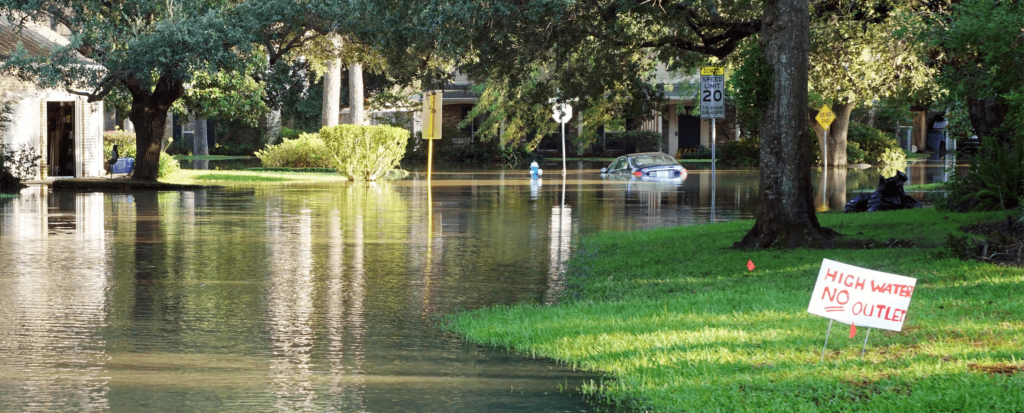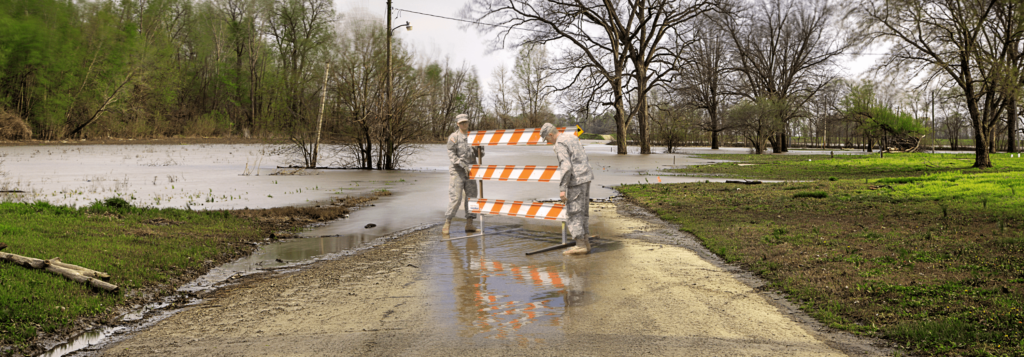Agriculture Innovation Act of 2023 (S.98)

The Agriculture Innovation Act of 2023 would strengthen agricultural data collection and distribution to connect farmers, ranchers, and foresters with the most effective conservation practices that enhance productivity, profitability, and flood resilience. Improved data would also help U.S. Department of Agriculture (USDA) technical assistance programs monitor the performance of conservation practices over time, allowing field […]
VA Flood Preparedness Act (H.R.7297)

This bill would provide the Department of Veterans Affairs (VA) with authority to help local governments cover portions of flood mitigation projects, including those that address the risk of flooding associated with rising sea levels. The bill would also direct the VA to submit a report to Congress on the threat flooding poses to its […]
National Climate Adaptation and Resilience Strategy Act (S.3531 / H.R.6461)

This bill would establish a Chief Resilience Officer in the White House to coordinate a new, whole-of-government National Climate Adaptation and Resilience Strategy. This strategy would articulate a vision for how the federal government will prepare for the effects of flooding and extreme weather, and ensure policies and resources equitably support historically underserved, frontline communities. […]
Disaster Resiliency Planning Act (S.3510 / H.R.7863)

The bill would require federal agencies to incorporate disaster resilience into real property asset management and investment decisions. Specifically, the Office of Management and Budget would be required to establish guidance to direct all agencies to incorporate risk assessments, such as vulnerability assessments, into such decisions. WHY WE LIKE IT The federal government spends a […]
FEMA Relief Extension Act (H.R.5668)

The FEMA Relief Extension Act would extend federal housing assistance available to individuals and households under the Federal Emergency Management Agency’s Individual Assistance program, from an 18-month to 24-month period. WHY WE LIKE IT After a flood, it can take months or even years before people can fully assess the extent of damage and utilize […]
Enhancing Military Base Resilience And Conserving Ecosystems through Stormwater Management Act (H.R.5262 / S.3183)

This bill would provide the Department of Defense (DoD) with flexibility to use construction funding to more efficiently manage stormwater and improve flood resilience at military bases. The EMBRACE Act would establish a program at DoD to implement stormwater projects that retrofit buildings, improve defense access roads, and protect their surrounding waterways and ecosystems that […]
Preliminary Damage Assessment Improvement Act of 2021 (H.R. 3709)

This bill would improve and streamline the process for conducting preliminary damage assessments, an important step in the disaster recovery process. H.R. 3709 would establish an advisory panel of emergency management personnel to consider measures that strengthen the Federal Emergency Management Agency’s ability to conduct consistent and timely preliminary damage assessments after disasters strike. These […]
Resilient Florida Trust Fund (SB 2514 / HB 7021)
This bill would create the Resilient Florida Trust Fund administered by the Florida Department of Environmental Protection (DEP) to provide funding to the Resilient Florida Grant Program and the Statewide Flooding and Sea Level Rise Resilience Plan. Florida DEP may also use the trust to fund the Florida Flood Hub for Applied Research and Innovation, […]
Hazard Eligibility and Local Projects Act (H.R.1917 / S.1877)

The HELP Act would expedite the approval process for certain eligible disaster mitigation projects—allowing such projects to begin without the risk of losing potential federal funds. Under current law, local and state agencies applying for federal money to begin mitigation assistance projects must wait until they receive formal approval from FEMA before purchasing land or […]
Flood Level Observation, Operations, and Decision Support Act (S.558 / H.R.1438)

The Flood Level Observation, Operations, and Decision Support (FLOODS) Act would enact comprehensive solutions to improve the National Oceanic and Atmospheric Administration (NOAA)’s ability to monitor, forecast, and communicate about flood and hurricane events to state and local governments and the public. The bill would establish a National Integrated Flood Information System to provide states […]